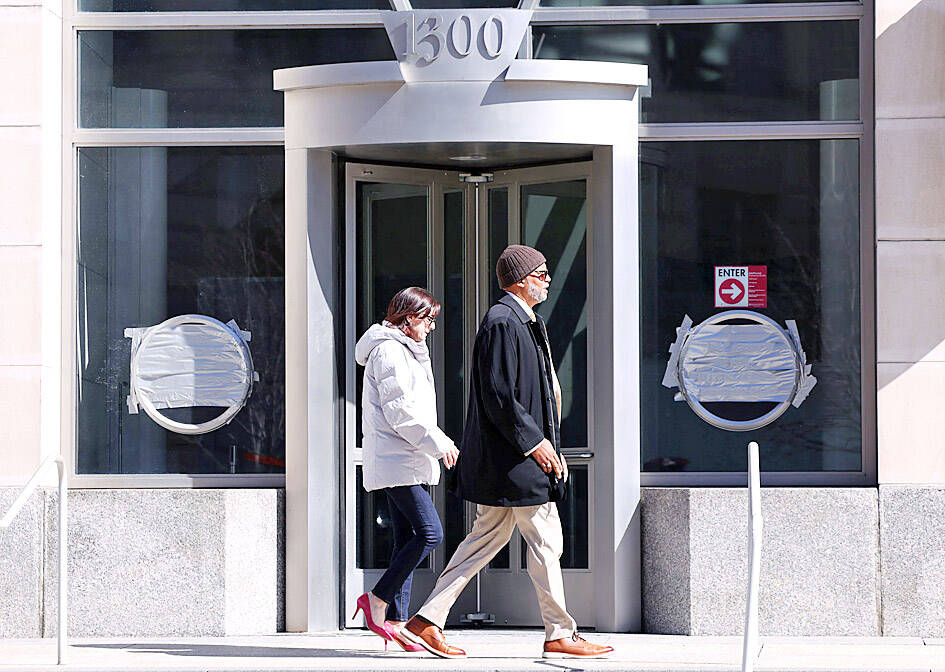The US has dramatically cut the budgets of overseas development and aid programs, with multi-year contracts pared down by 92 percent, or US$54 billion, the US Department of State said on Wednesday.
On his first day in office, US President Donald Trump signed an executive order demanding a freeze on all US foreign aid for 90 days. The pause aimed to allow the administration to review overseas spending with an eye to gutting programs not aligned with Trump’s “America first” agenda.
The review in part targeted multi-year foreign assistance contracts awarded by the US Agency for International Development (USAID), with the vast majority eliminated during its course.

Photo: Reuters
“At the conclusion of a process led by USAID leadership, including tranches personally reviewed by [US] Secretary [of State Marco] Rubio, nearly 5,800 awards with US$54 billion in value remaining were identified for elimination as part of the America First — a 92 percent reduction,” a state department spokesperson said in a statement.
The review also looked at more than 9,100 grants involving foreign assistance, valued at more than US$15.9 billion. At the conclusion of the review, 4,100 grants worth almost US$4.4 billion were targeted to be eliminated, a 28 percent reduction.
“These commonsense eliminations will allow the bureaus, along with their contracting and grants officers, to focus on remaining programs, find additional efficiencies and tailor subsequent programs more closely to the administration’s America first priorities,” the state department said.
Programs that were not cut included food assistance, life-saving medical treatments for diseases like HIV and malaria, and support for countries including Haiti, Cuba, Venezuela and Lebanon, among others, the spokesperson said.
On Tuesday, a federal judge gave the Trump administration less than two days to unfreeze all aid, after a previous court order issued nearly two weeks earlier went ignored.
The Trump administration filed a petition to put a hold on the lower-court order, which was granted by US Supreme Court Chief Justice John Roberts late on Wednesday, US media reported.
USAID, created after a bill passed by the US Congress in 1961, had a workforce of more than 10,000 employees prior to the freeze, which sparked shock and dismay among personnel.
The agency announced on Sunday that it was laying off 1,600 of its employees in the US and placing most of the remaining staff on administrative leave.
During his election campaign, Trump promised to slash federal government spending and bureaucracy, a task he bestowed upon his top donor and close adviser, billionaire Elon Musk, as part of the newly created US Department of Government Efficiency.
See Australia on page 5

‘ABUSE OF POWER’: Lee Chun-yi allegedly used a Control Yuan vehicle to transport his dog to a pet grooming salon and take his wife to restaurants, media reports said Control Yuan Secretary-General Lee Chun-yi (李俊俋) resigned on Sunday night, admitting that he had misused a government vehicle, as reported by the media. Control Yuan Vice President Lee Hung-chun (李鴻鈞) yesterday apologized to the public over the issue. The watchdog body would follow up on similar accusations made by the Chinese Nationalist Party (KMT) and would investigate the alleged misuse of government vehicles by three other Control Yuan members: Su Li-chiung (蘇麗瓊), Lin Yu-jung (林郁容) and Wang Jung-chang (王榮璋), Lee Hung-chun said. Lee Chun-yi in a statement apologized for using a Control Yuan vehicle to transport his dog to a

Taiwan yesterday denied Chinese allegations that its military was behind a cyberattack on a technology company in Guangzhou, after city authorities issued warrants for 20 suspects. The Guangzhou Municipal Public Security Bureau earlier yesterday issued warrants for 20 people it identified as members of the Information, Communications and Electronic Force Command (ICEFCOM). The bureau alleged they were behind a May 20 cyberattack targeting the backend system of a self-service facility at the company. “ICEFCOM, under Taiwan’s ruling Democratic Progressive Party, directed the illegal attack,” the warrant says. The bureau placed a bounty of 10,000 yuan (US$1,392) on each of the 20 people named in

The High Court yesterday found a New Taipei City woman guilty of charges related to helping Beijing secure surrender agreements from military service members. Lee Huei-hsin (李慧馨) was sentenced to six years and eight months in prison for breaching the National Security Act (國家安全法), making illegal compacts with government employees and bribery, the court said. The verdict is final. Lee, the manager of a temple in the city’s Lujhou District (蘆洲), was accused of arranging for eight service members to make surrender pledges to the Chinese People’s Liberation Army in exchange for money, the court said. The pledges, which required them to provide identification

INDO-PACIFIC REGION: Royal Navy ships exercise the right of freedom of navigation, including in the Taiwan Strait and South China Sea, the UK’s Tony Radakin told a summit Freedom of navigation in the Indo-Pacific region is as important as it is in the English Channel, British Chief of the Defence Staff Admiral Tony Radakin said at a summit in Singapore on Saturday. The remark came as the British Royal Navy’s flagship aircraft carrier, the HMS Prince of Wales, is on an eight-month deployment to the Indo-Pacific region as head of an international carrier strike group. “Upholding the UN Convention on the Law of the Sea, and with it, the principles of the freedom of navigation, in this part of the world matters to us just as it matters in the